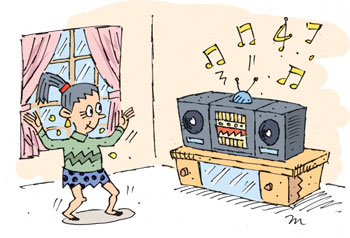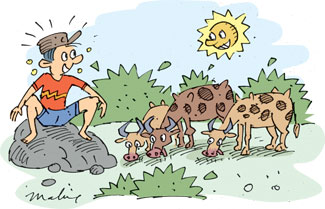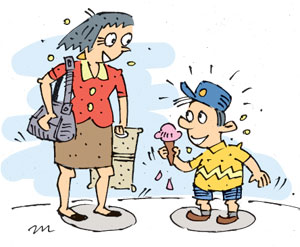|

by R. S. Karunaratne
Relative clauses with ‘Which’
We use relative clauses with ‘which’
to describe all nouns except people.
I am watching some birds which are flying in the sky.
Father is driving a car which belongs to his brother.
Children play hide and seek which is an interesting game.
She is listening to a song which is sung by Amaradeva.
Marina always wears clothes which are out of fashion.
|

She is listening to a song which
is sung by Amaradeva. |
A relative clause with ‘which’ has a
finite verb.
Susima is arranging the flowers which are beautiful.
Nalin is reading a novel which is interesting.
We must eat different kinds of food which are nourishing.
Varuna has been made a director of the company which produces furniture.
Help yourself to the cake which I bought just now.
The
finite verb of a relative clause must agree with its subject.
Dharma is watching some cows which are grazing.
We moved into a new house which is beside a river.
I am going to buy a car which is not too expensive.
I do not like the remarks which you made about my friend.
Some people quarrel about pets which give them pleasure.
[Activity]
Complete the following clauses using ‘which’ or ‘who’. Check your
answers with the key.
1. Anura watched the car .................. was coming towards him.
2. This is the policewoman ................. helped me to find my way.
3. The king admired the architect .................. built his new
palace.
4. The farmer caught the fox ..................... was running away with
one of his hens.
5. My friend lives in a village .................... is near Ratnapura.
6. The police are looking for the man ................... robbed the
bank.
7. The mechanic is repairing the gate .................. fell off its
hinges.
|

Dharma is watching some cows
which are grazing.
|
8. We watched the elephants ..................... were drinking water at
the pool.
9. She was lying on a sofa ...................... was very comfortable.
10. Shyma jumped up and caught the kite .................. was floating
in the air.
***********
Key:
1. which, 2. who, 3. who, 4. which, 5. which, 6. who, 7. which, 8.
which, 9. which, 10. which
***********
Know
your idioms
Idioms are a colourful and fascinating aspect of English. They are
used both in formal and informal English. If you can understand idioms,
your language skills will improve rapidly. Here is a quiz to test your
knowledge of idioms. Tick off the answer you think is correct and check
your answers with the key.
1. Hema will not take no for an answer.
(a) continue to ask for something although her request has been
refused
(b) not ask for something she has already been given
(c) will not be satisfied with anything she gets
2. The union has upped the ante by refusing to negotiate with the
government.
(a) come to a settlement
(b) given up its demands
(c) increased its demands
3. Varuni has got ants in her pants because she is attending a beauty
queen contest tonight. (Humorous)
(a) is troubled
(b) is excited
(c) is sad
4. Anybody who is anybody will be at the opening ceremony. (Humorous)
(a) important people
(b) strangers
(c) well-dressed people
5. A: Who is going to win the elections?
B: That’s anybody’s guess.
(a) everybody knows it
(b) nobody knows it
(c) some people know it
6. Nethmi is the apple of my eye.
(a) person who I can do without
(b) person who I do not like
(c) person who I love most
7. Marina keeps her house in apple pie order.
(a) in good order
(b) in bad order
(c) shabbily
8. Did you hear all that argy-bargy outside the bedroom? (Informal)
(a) loud arguments
(b) mild disagreements
(c) fights
9. Manual printing presses have gone out of the ark. (Humorous)
(a) are expensive
(b) are very much in demand
(c) are not used any more
10. We found that the robber was armed to the teeth.
(a) had many weapons
(b) had no arms
(c) was powerless
************
Key:
1. (a), 2. (c), 3. (b), 4. (a), 5. (b), 6. (c),7. (a), 8. (a), 9.
(c), 10 (a)
************
Starters:
Correct use of
‘One’and
‘Ones’
‘One’ is singular and ‘ones’ is plural. The use of ‘one’ and ‘ones’
is quite common in informal English.
Susan goes to a shop and asks for a pen.
|

The ice-cream is nice. Can I
have another one? |
Susan: I need a pen.
Sales assistant: Which one do you want? Black or blue?
A: Which motorcycle is yours?
B: That one.
A: Which school do you attend?
B: The one near the church.
A: Which hotel do you stay at?
B: The one on the hill.
A: I don’t like the blue tie but I like the red one.
B: The red one is expensive.
At a hotel
This room is too small. Can I have a bigger one?
This plate is dirty. Please bring a clean one.
The ice-cream is nice. Can I have another one?
‘Ones’ is used to indicate plural nouns.
At a shop
Customer: I don’t like the brown shoes but I like the black ones.
Salesperson: Don’t buy those oranges. Buy the other ones.
At a hotel
Customer: These plates are dirty. Can I have some clean ones?
‘One’ and ‘ones’ are used to avoid repeating a countable
noun.However, they are not used in formal English. They are never used
to replace uncountable nouns.
‘One’ is used to indicate time.
I’ll see you at one. (1 o’clock)
We use ‘one’ in formal English before ‘hundred or thousand’.
He wrote a cheque for one thousand rupees.
It will cost you one hundred and fifty rupees.
We use ‘one’ for emphasis.
She is the one person I always trust.
We use ‘one day’ to indicate ‘at some time in the future.’
You will realise the gravity of it one day.
‘One’ is used with a person’s name when we do not know him.
One Mr Perera is waiting to see you.
Test your verbal
skills
Write the opposite words in the blanks. Every word should begin with
the letter ‘G’. Check your answers with the key.
1. Lose ........................
2. Midget ....................
3. Special .......................
4. Lady ...............................
5. Take ...............................
6. Sad ..............................
7. Boy ...............................
8. Happy ..........................
9. Plain ........................
10. Hello ...........................
11. Bad .........................
12. Stingy ..........................
13. Little .........................
14. Rough ...........................
15. Bride ............................
16. Unprotected ..........................
17. Experienced .............................
18. Scarcity ................................
19. Crazy.........................
20. Brave.....................
Key:
1. gain 2. giant 3. general 4. gentleman 5. give 6. glad 7. girl 8.
gloomy 9. grand
10. goodbye 11. good 12. generous 13. gigantic 14. gentle 15. groom 16.
guarded 17. green 18. glut 19. gaga 20. gallant |

